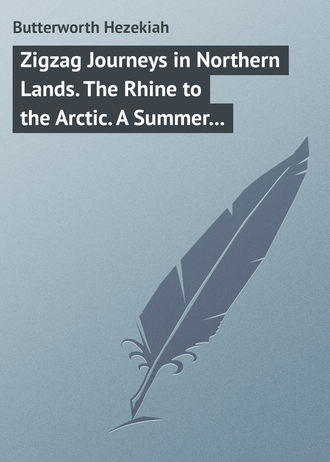 полная версия
полная версияZigzag Journeys in Northern Lands. The Rhine to the Arctic. A Summer Trip of the Zig-Zag Club Through Holland, Germany, Denmark, Norway, and Sweden
“The tributaries of the old Rhine are small; those of the new are almost as large as the old Rhine itself, – the gloomy Saguenay, and the sparkling Ottawa.
“Think of its lakes! Lake Ladoga, the largest lake in Europe, contains only 6,330 square miles. Lake Superior has 32,000 square miles, and Michigan 22,000 square miles.
“You will soon have a view of the mountain scenery of the lower St. Lawrence. The pine-covered walls along which trail the clouds of the sky are almost continuous to Montreal.”
“But why,” asked Charlie Leland, “is the German Rhine so famous, and ours so little celebrated?”
“The German Rhine gathers around it the history of two thousand years; ours, two hundred years. What will our Rhine be two thousand years from to-day?”
He added: —
“I look upon New England as one of the best products of civilization thus far. But there is rising a new New England in the West, a vast empire in the States of the Northwest and in Canada, to which New England is as a province, – an empire that in one hundred years will lead the thought, the invention, and the statesmanship of the world. Every prairie schooner that goes that way is like a sail of the ‘Mayflower.’
“In yonder steerage are a thousand emigrants. The easy-going, purse-proud cabin passengers do not know it; they do not visit them or give much thought to them: but there are the men and women whose children will one day sway the empire that will wear the crown of the world.
“The castles are fading from view on the hills of the old Rhine; towns and cities are leaping into life on the new. The procession of cities, like a triumphal march, will go on, on, on. The Canadian Empire will probably one day lock hands with the imperial States of the Northwest; Mexico, perhaps, will join the Confederacy, and Western America will doubtless vie with Eastern Russia in power, in progress, and in the glories of the achievements of the arts and sciences. Our Rhine has the future: let the old Rhine have the past.”
The Class approached Quebec at night. The scene was beautiful: like a city glimmering against the sky, the lights of the lower town, of the upper town, and of the Castle standing on the heights, shone brightly against the hills; and the firing of guns and the striking of bells were echoed from the opposite hills of the calm and majestic river.
The Class spent a day at Quebec, chiefly on the Terrace, – one of the most beautiful promenades in the world. From the Terrace the boys saw the making up of the emigrant trains on the opposite side of the river, where the steamer had landed, and saw them disappear along the winding river, going to the great province of Ontario, the lone woods of Muskoka, and the far shores of the Georgian Bay.
“I wish we might make a Zigzag journey on the St. Lawrence,” said Charlie Leland.
“And collect the old legends, stories, and histories of the Indian tribes, and the early explorers and French settlers,” added Mr. Beal. “Perhaps some day we may be able to do so. I am in haste to return to the States, but I regret to leave a place so perfectly beautiful as the Terrace of Quebec. It is delightful to sit here and see the steamers go and come; to watch the bright, happy faces pass, and to recall the fact that the river below is doubtless to be the water-path of the nations that will most greatly influence future times. But our journey is ended: let us go.”
ON THE TERRACE, – QUEBECAlone, beside these peaceful gunsI walk, – the eve is calm and fair;Below, the broad St. Lawrence runs,Above, the castle shines in air,And o’er the breathless sea and landNight stretches forth her jewelled hand.Amid the crowds that hurry past —Bright faces like a sunlit tide —Some eyes the gifts of friendship castUpon me, as I walk aside,Kind, wordless welcomes understood,The Spirit’s touch of brotherhood.Below, the sea; above, the sky,Smile each to each, a vision fair;So like Faith’s zones of light on high,A sphere seraphic seems the air,And loving thoughts there seem to meet,And come and go with golden feet.Below me lies the old French town,With narrow rues and churches quaint,And tilèd roofs and gables brown,And signs with names of many a saint.And there in all I see appearsThe heart of twice an hundred years.Beyond, by inky steamers mailed,Point Levi’s painted roofs arise,Where emigration long has hailedThe empires of the western skies;And lightly wave the red flags there,Like roses of the damask air.Peace o’er yon garden spreads her palm,Where heroes fought in other days;And Honor speaks of brave MontcalmOn Wolfe’s immortal shaft of praise.What lessons that I used to learnIn schoolboy days to me return!Fair terrace of the Western Rhine,I leave thee with unwilling feet,I long shall see thy castle shineAs bright as now, in memories sweet;And cheerful thank the kindly eyesThat lent to me their sympathies.Go, friendly hearts, that met by chanceA stranger for a little while;Friendship itself is but a glance,And love is but a passing smile.I am a pilgrim, – all I meetAre glancing eyes and hurrying feet.Farewell; in dreams I see againThe northern river of the vine,While crowns the sun with golden grainThe hillsides of the greater Rhine.And here shall grow as years increaseThe empires of the Rhine of Peace.


